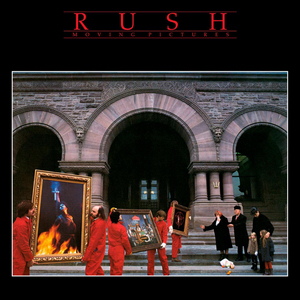OK cool, we're talking about
Hemispheres now. This is my favorite Rush album. Being the progger that I am, this shouldn't come as a surprise. It's the album that really got me into Rush and even progressive music as a whole. I knew
Moving Pictures and
2112 as well as a lot of their synth era material, but most of their 70's stuff was new territory.
Hemispheres couldn't have been a better introduction to their heavy prog side.
I too, prefer Cygnus Book II to Book I. I feel like this is when they finally perfected the side long epic. While it doesn't have anything that matches the greatness of the 2112 Overture/Temples, as a whole I find Hemispheres to be much better. It's not too heavy on the slower bits (which is something that dragged 2112 down a bit.) and there's no sections that drag on. Everything is perfect length, 18 minutes go by very quickly. I also like the lyrics a lot more than Book I. The left vs right brain concept is pretty cool. I also like how it ends with a ballady movement in The Sphere, an unconventional ending and a nice little tune. It's good that they didn't try to recreate 2112 with this, and instead went with something new. I'm also a sucker for reprises, and the Book I samples are pretty cool. Aside from that, I actually don't associate the two books that much, two very different pieces.
Hemispheres is a cool piece, but Side B is really where the album gets great. This is Rush at their most consistent; where
2112 showed a heavy focus on the one song causing side B to be less than stellar,
Hemispheres shows Rush giving proper care and attention to the entire album as a whole. All three songs on side B stand alone as great tracks.
Circumstances is a bit underrated I think, it gets overshadowed by The Trees and La Villa Strangiato, it's easy to forget about it. It's progressive, yet concise. Something that a lot of prog bands today can't accomplish. I especially like the slow keyboard interlude thing at around 2:20. I also really like Geddy's singing on this, the vocal reverb was a nice touch. His vocals on previous albums tended to be pretty dry.
The Trees is so good. Just like Circumstances, progressive but concise at the same time. But even more so. I remember when I first heard it I was very surprised that it only came out to 5 and a half minutes. There was so much going on, so many different parts. The 10/8 middle section is sublime. Some of my favorite lyrics too. Definitely a top ten song.
And finally we have my favorite Rush song. La Villa Strangiato. This epic instrumental is the apex of Rush's progressive rock era. I'm with Cornfed in thinking that this song should've elevated Lifeson to guitar god status. The solo is one of the best of all time, everything about it is perfect. Great phrasing, very dynamic, and an unbeatable buildup. The chaotic sections that follow are mindblowing too. So many changing parts, so much variety and yet somehow it manages to come back to the theme with ease. Another thing about this song that I love is the drums. This is maybe the only song that I can listen to only the drums and be satisfied. This is the song where we really see that Peart is a world class drummer.
Also on a slightly unrelated note, there was a very special guest at Rush's concert in Chicago last night:

 If so, I'll gladly provide a link.
If so, I'll gladly provide a link. If so, I'll gladly provide a link.
If so, I'll gladly provide a link.

 . But I won't anticipate.
. But I won't anticipate. I look forward to hearing your take on S&A when the time comes, since that is a record with a rather mixed reception.
I look forward to hearing your take on S&A when the time comes, since that is a record with a rather mixed reception.


